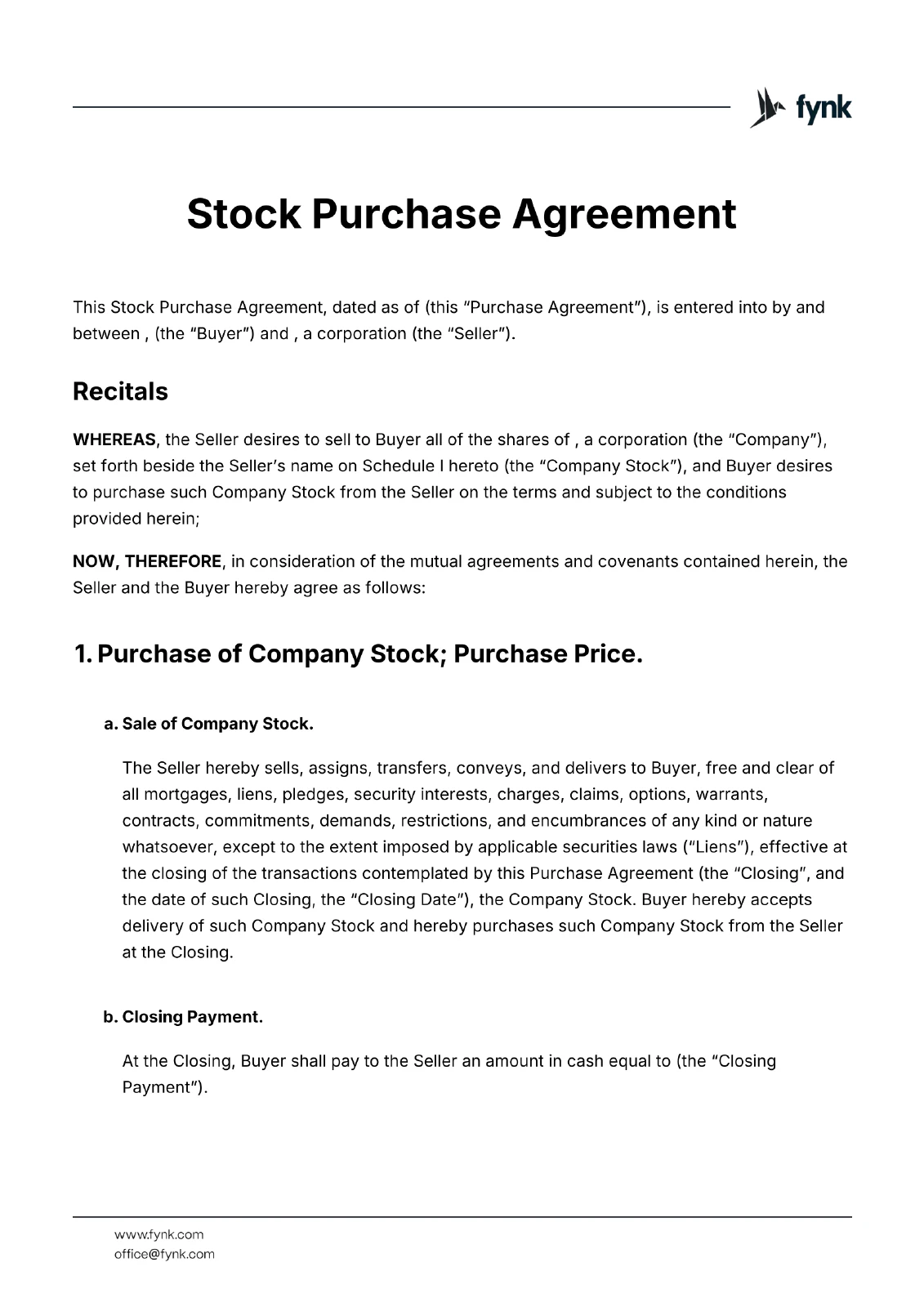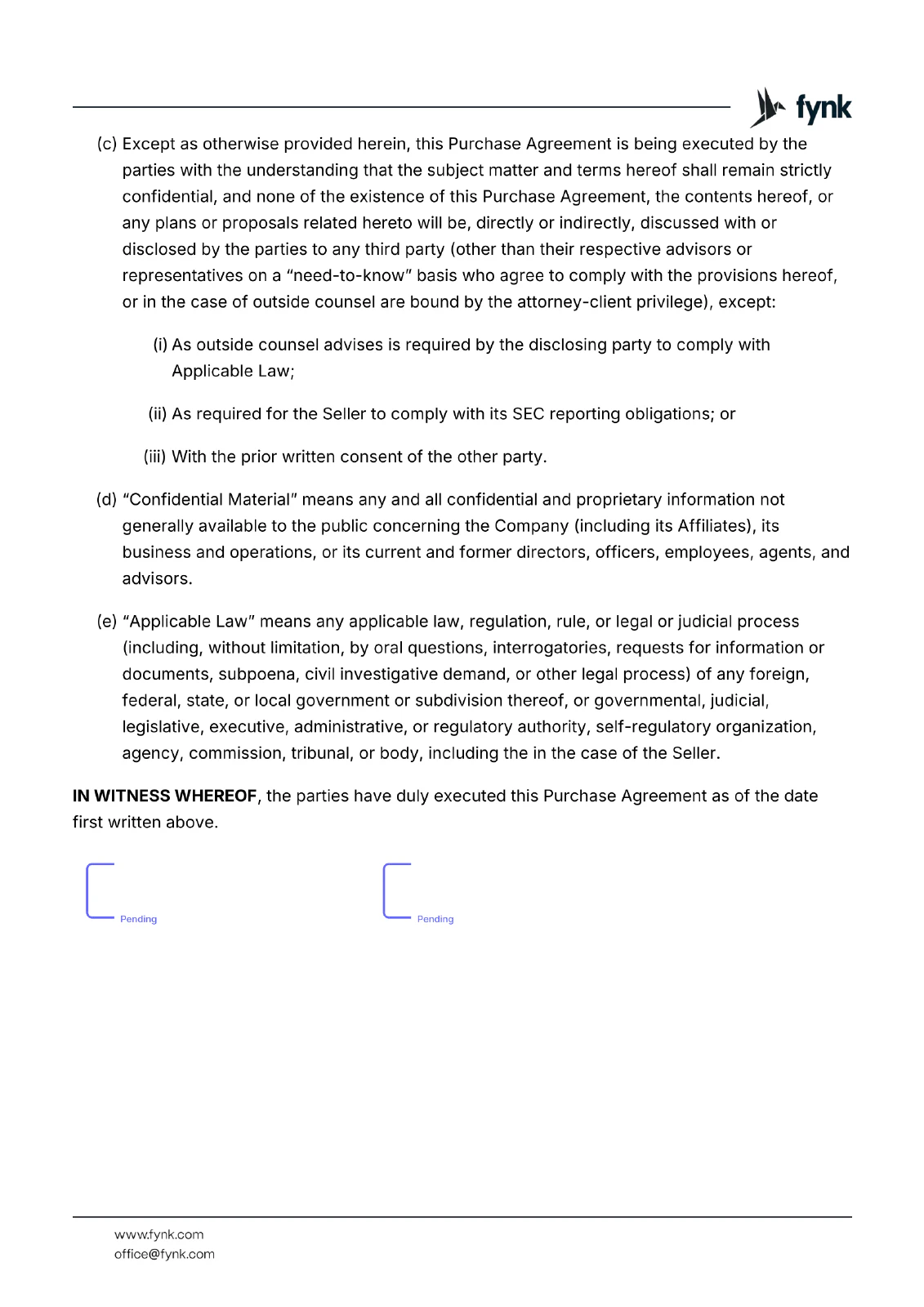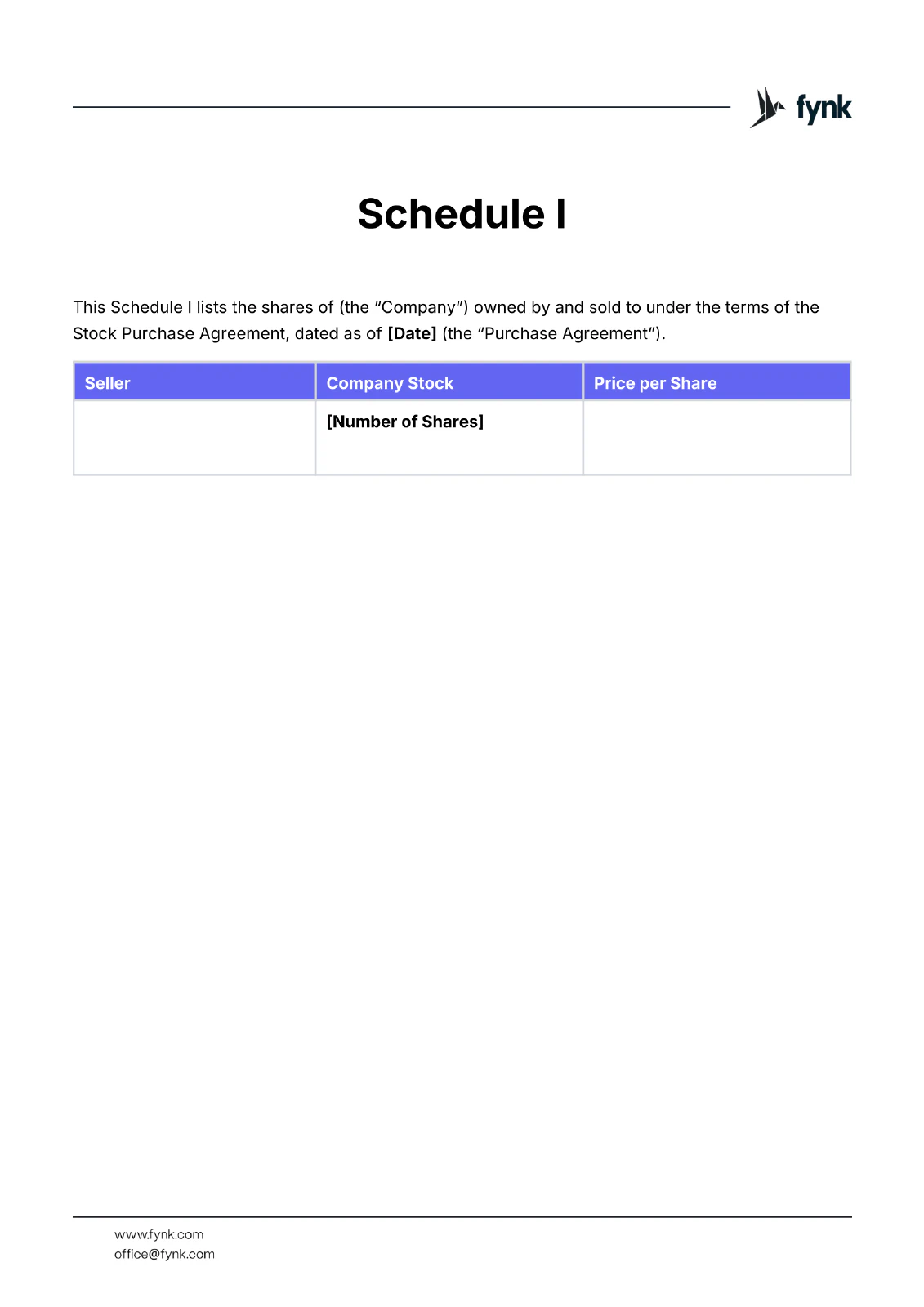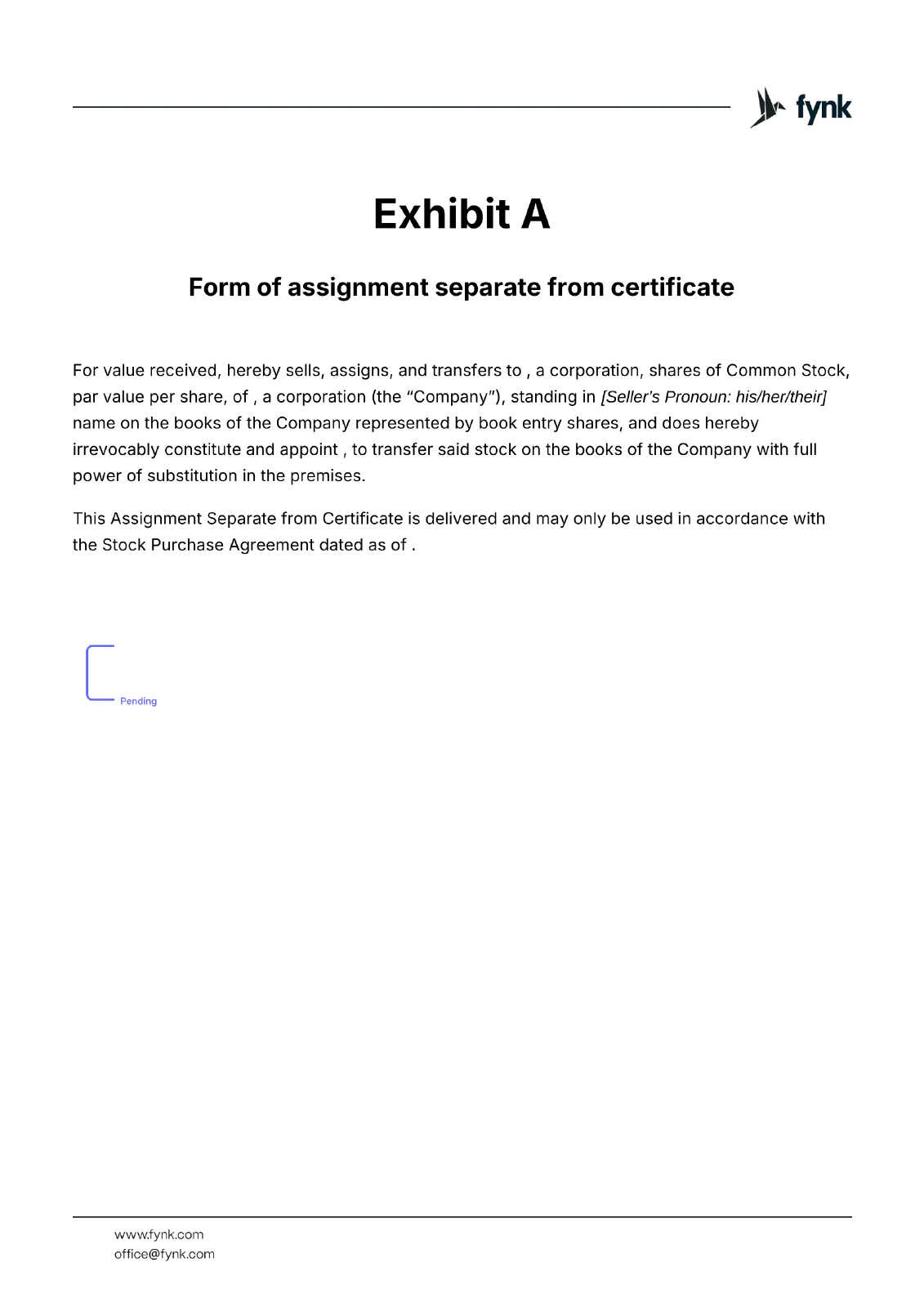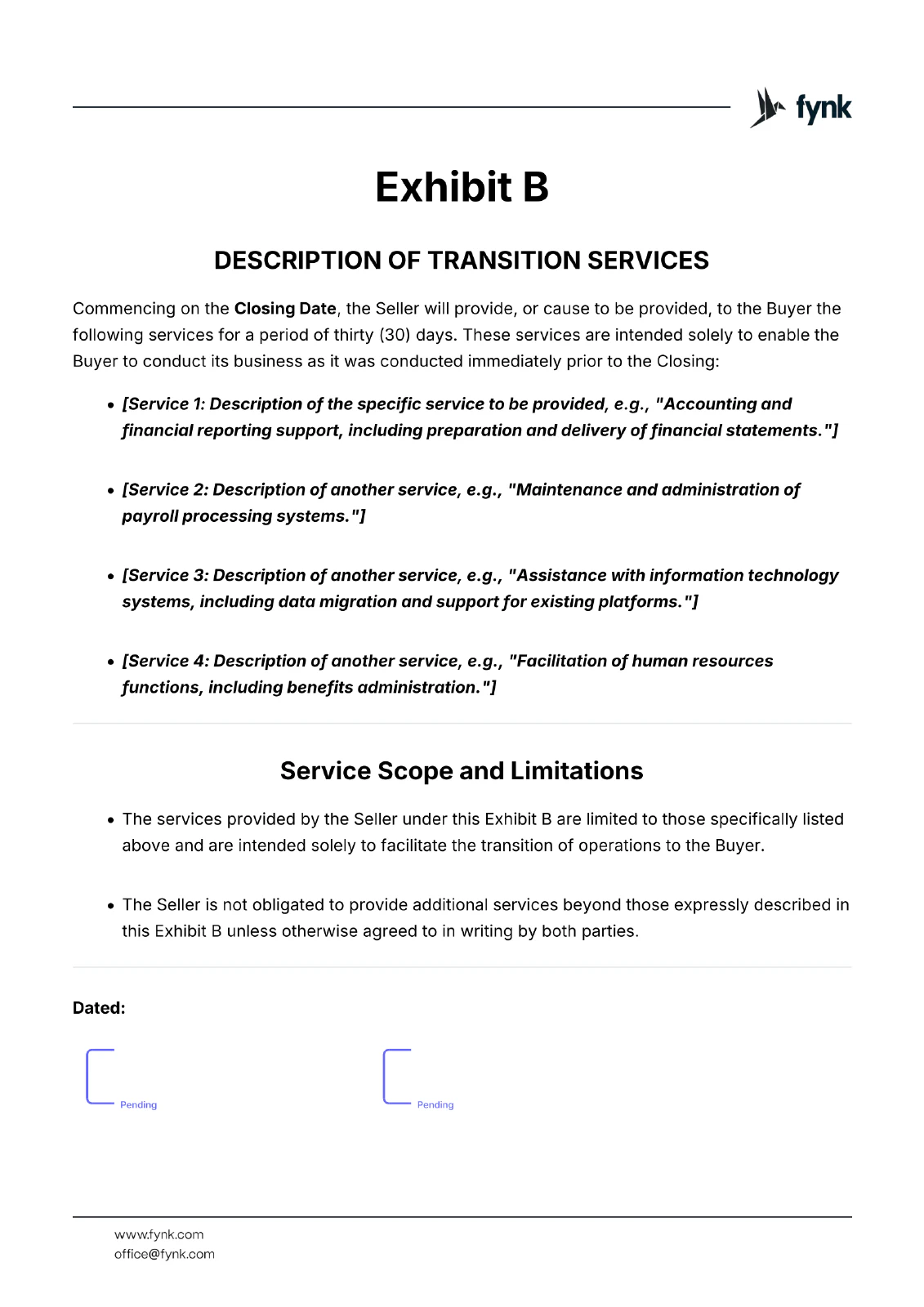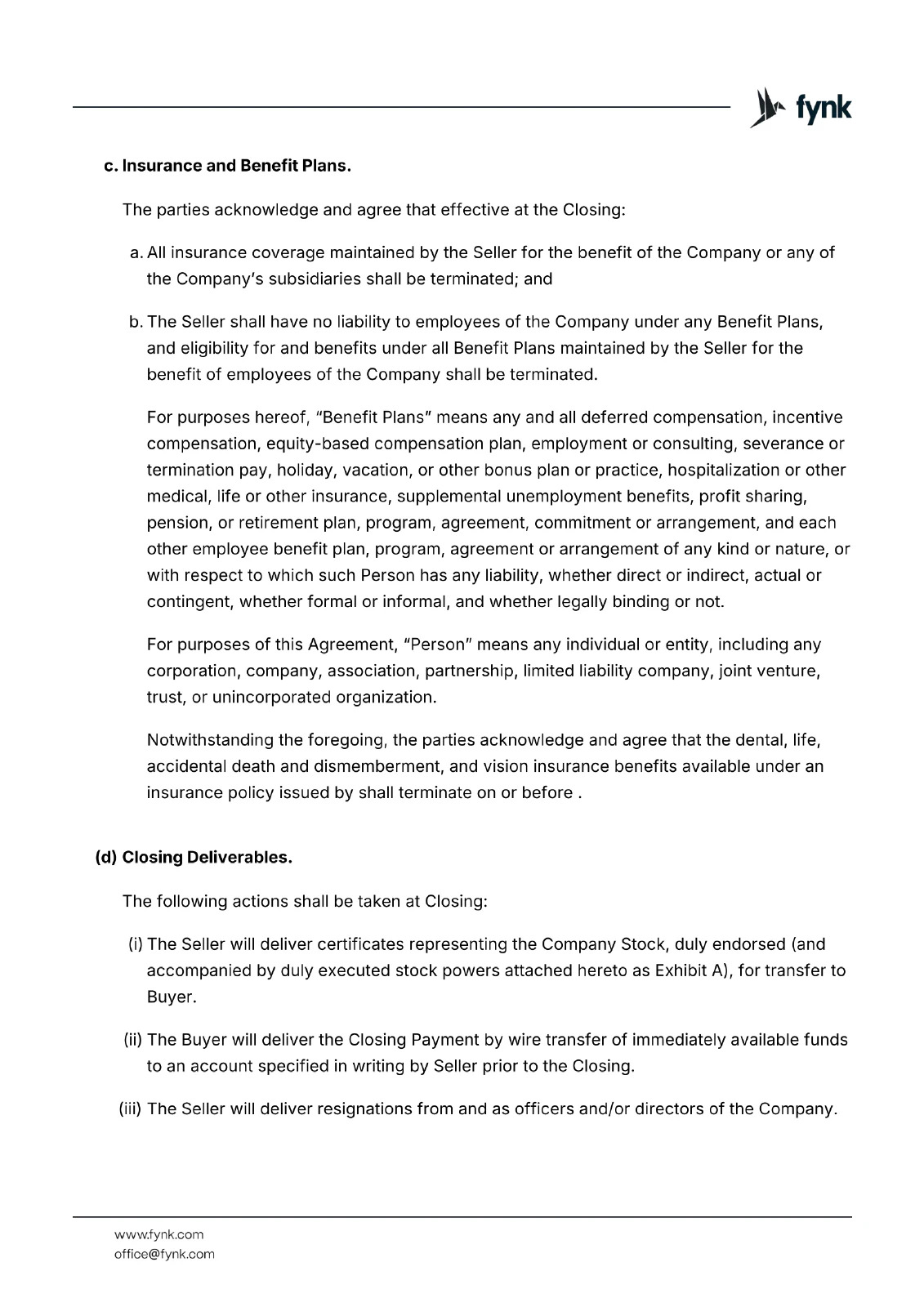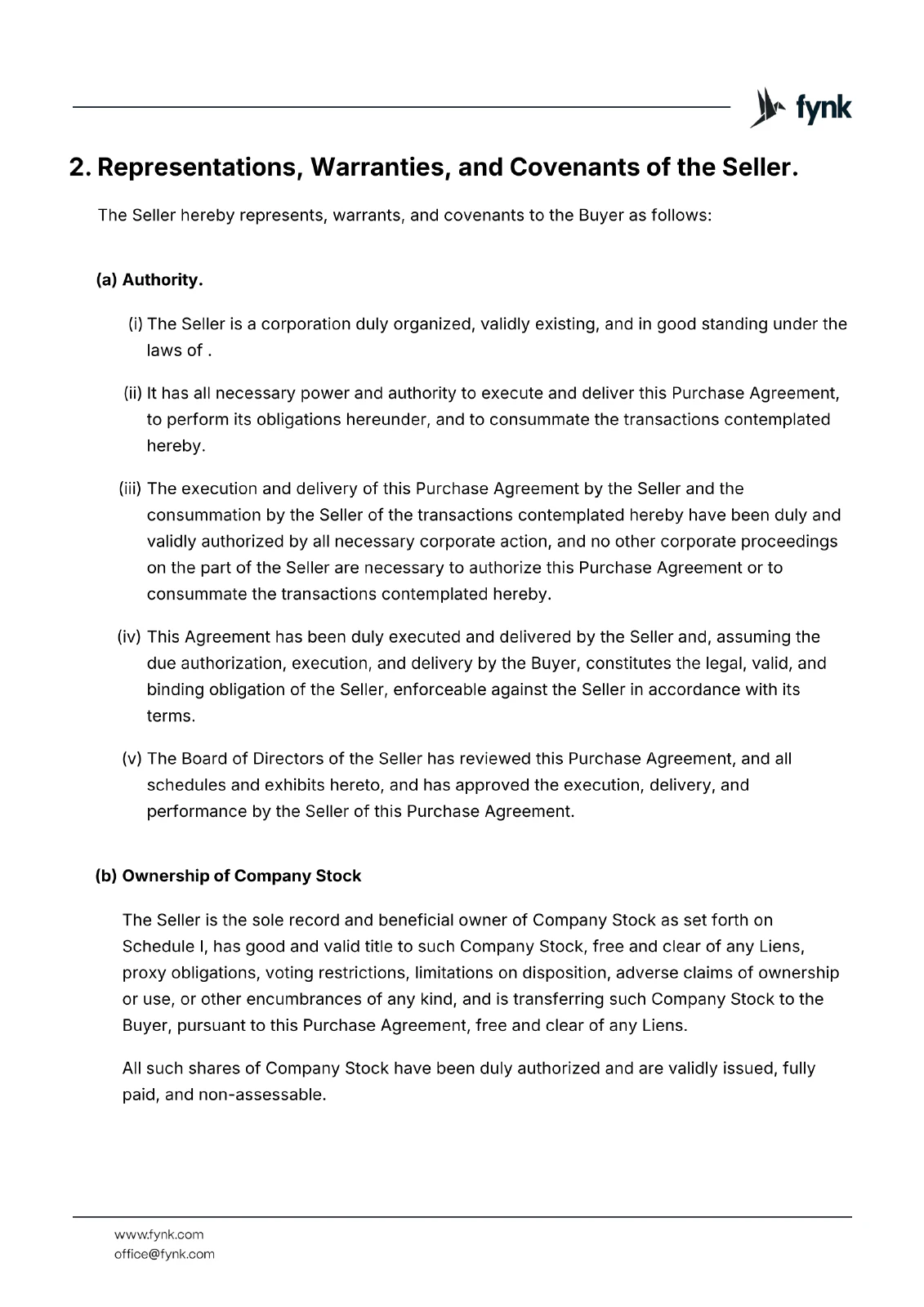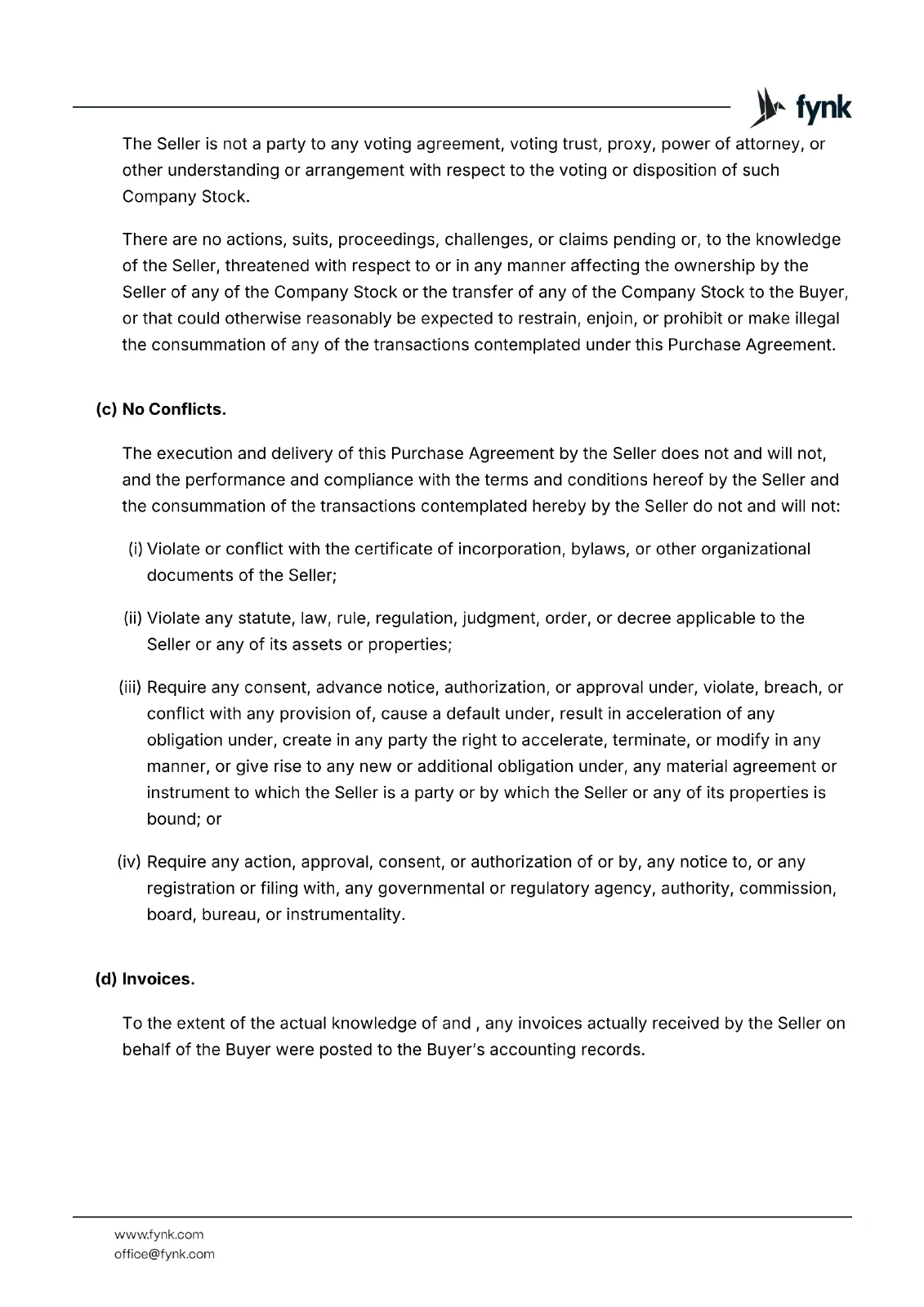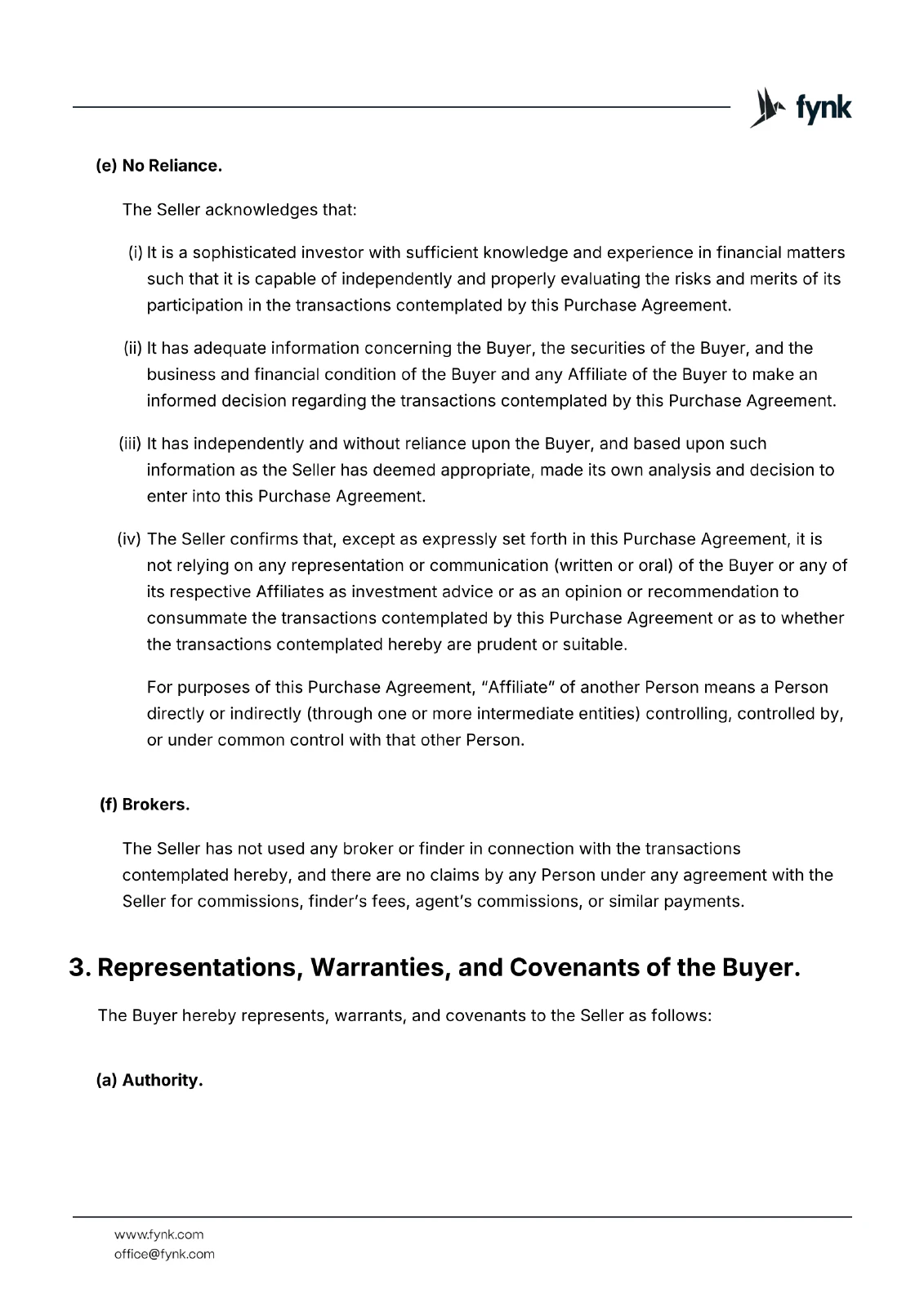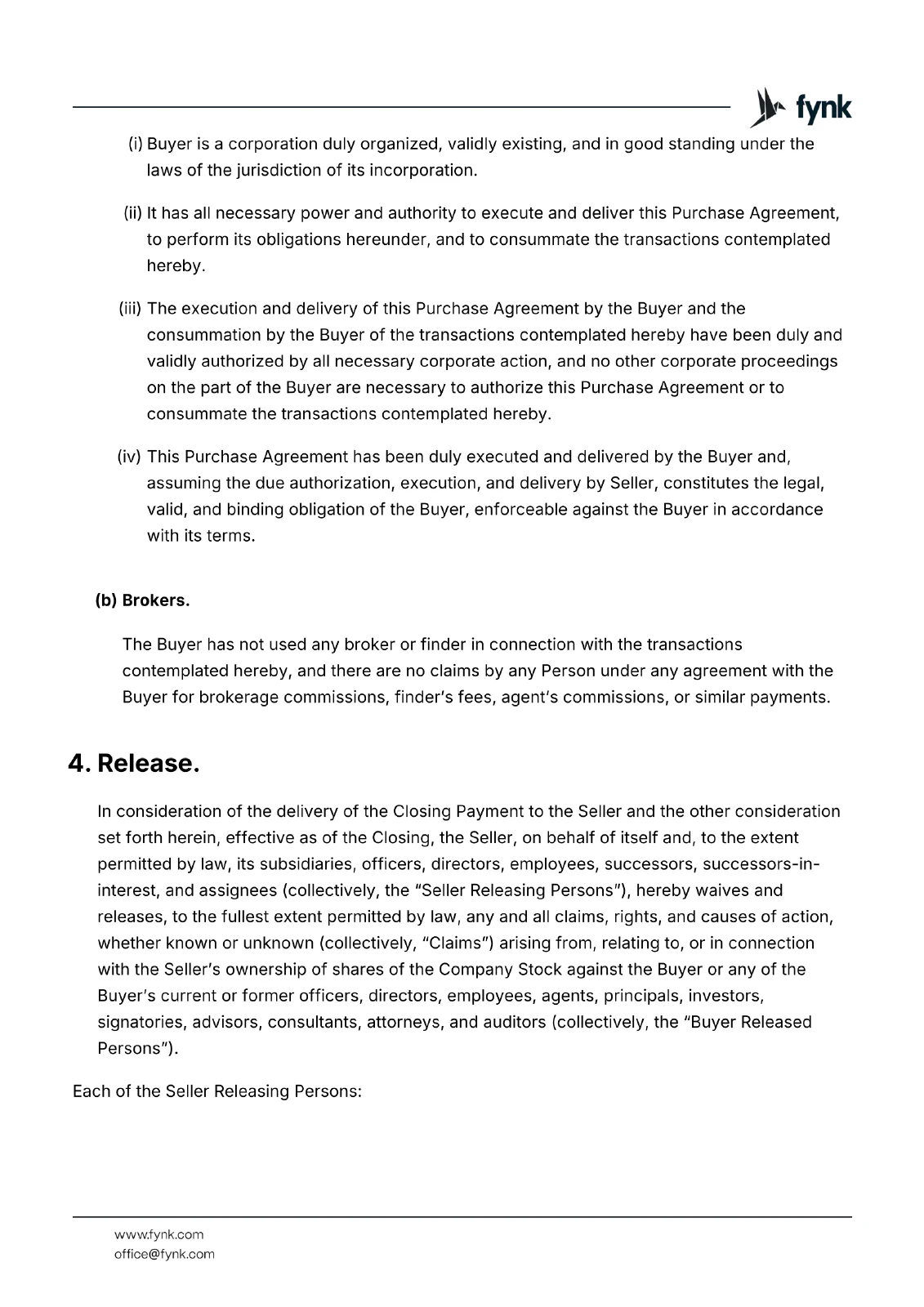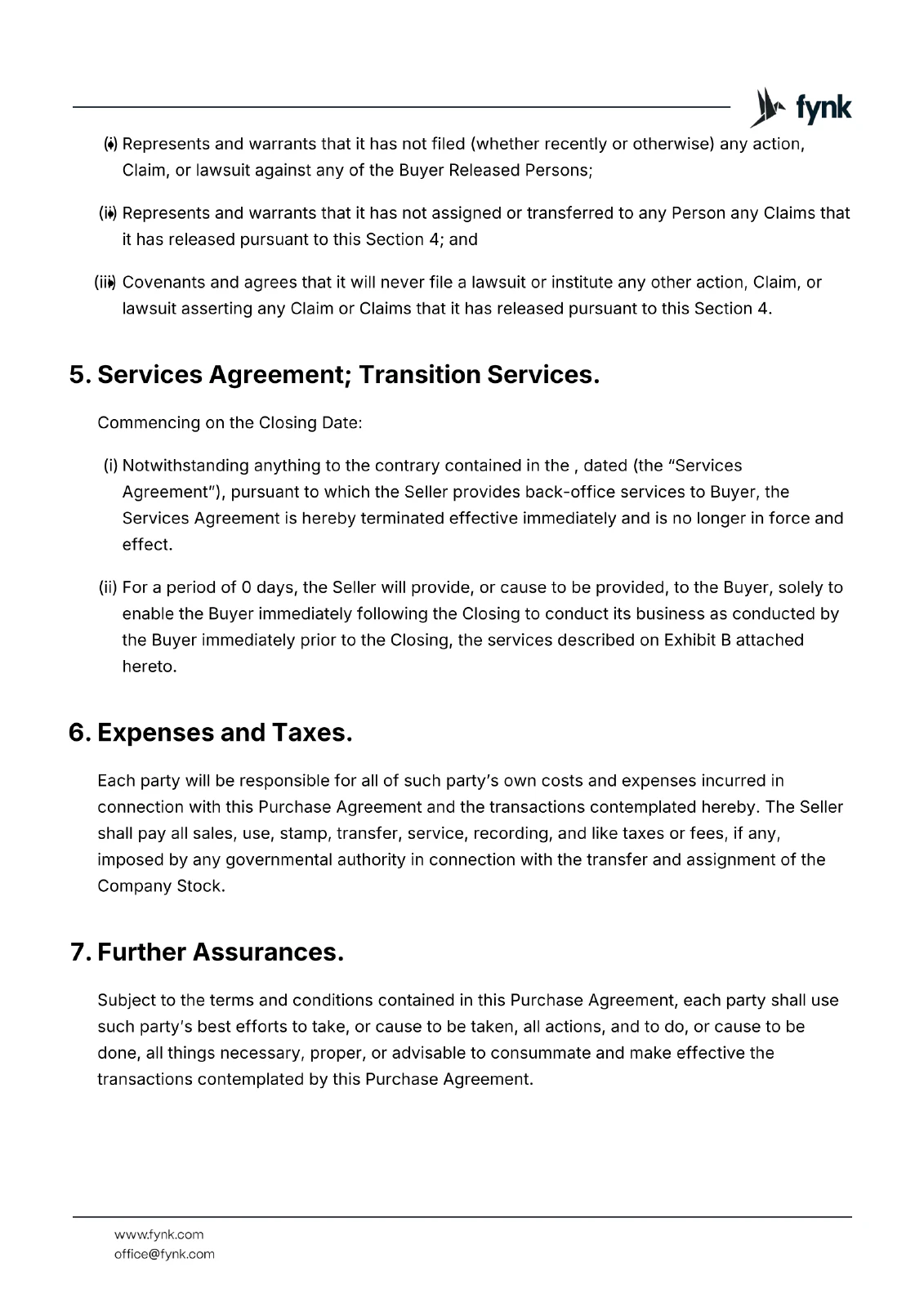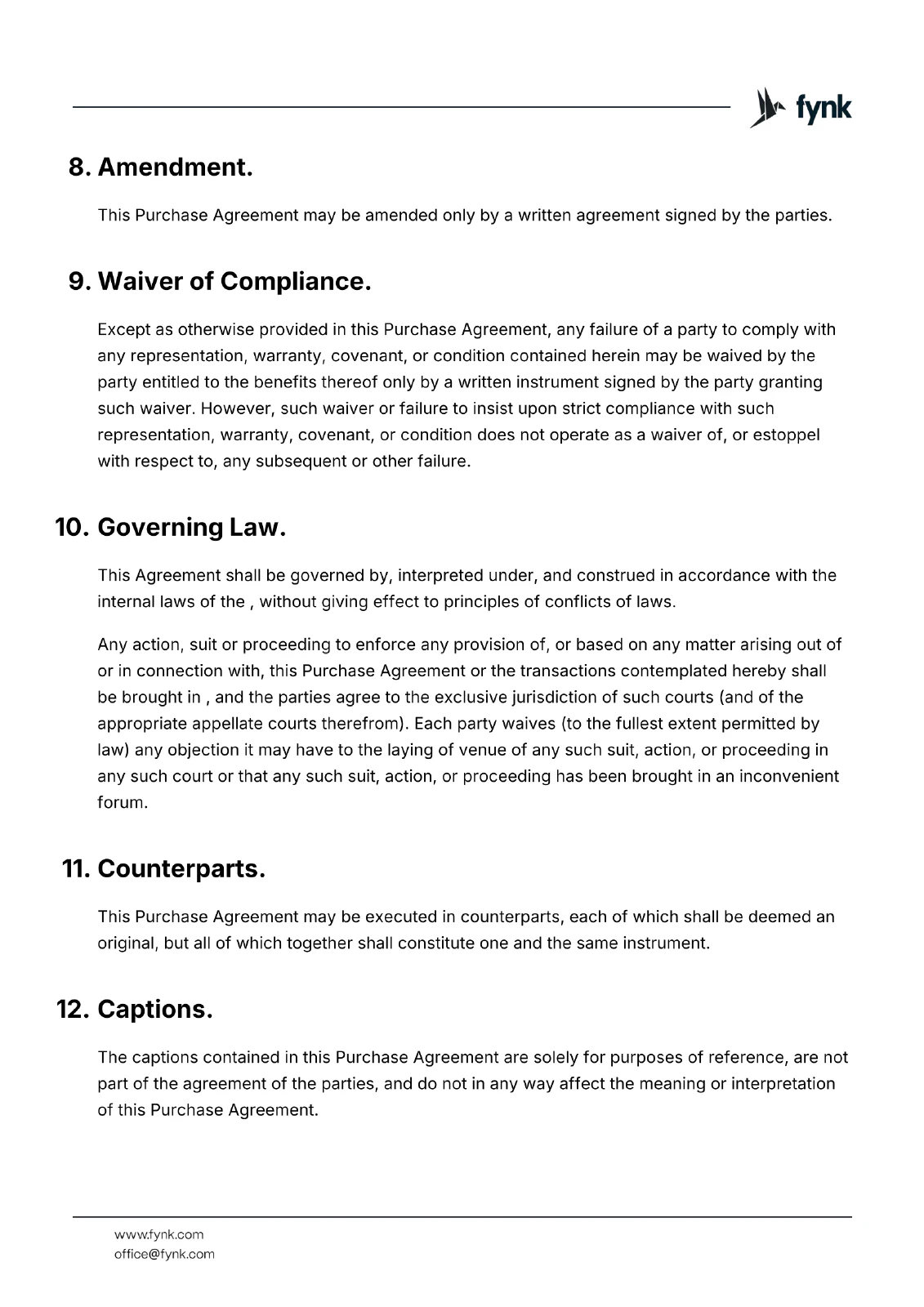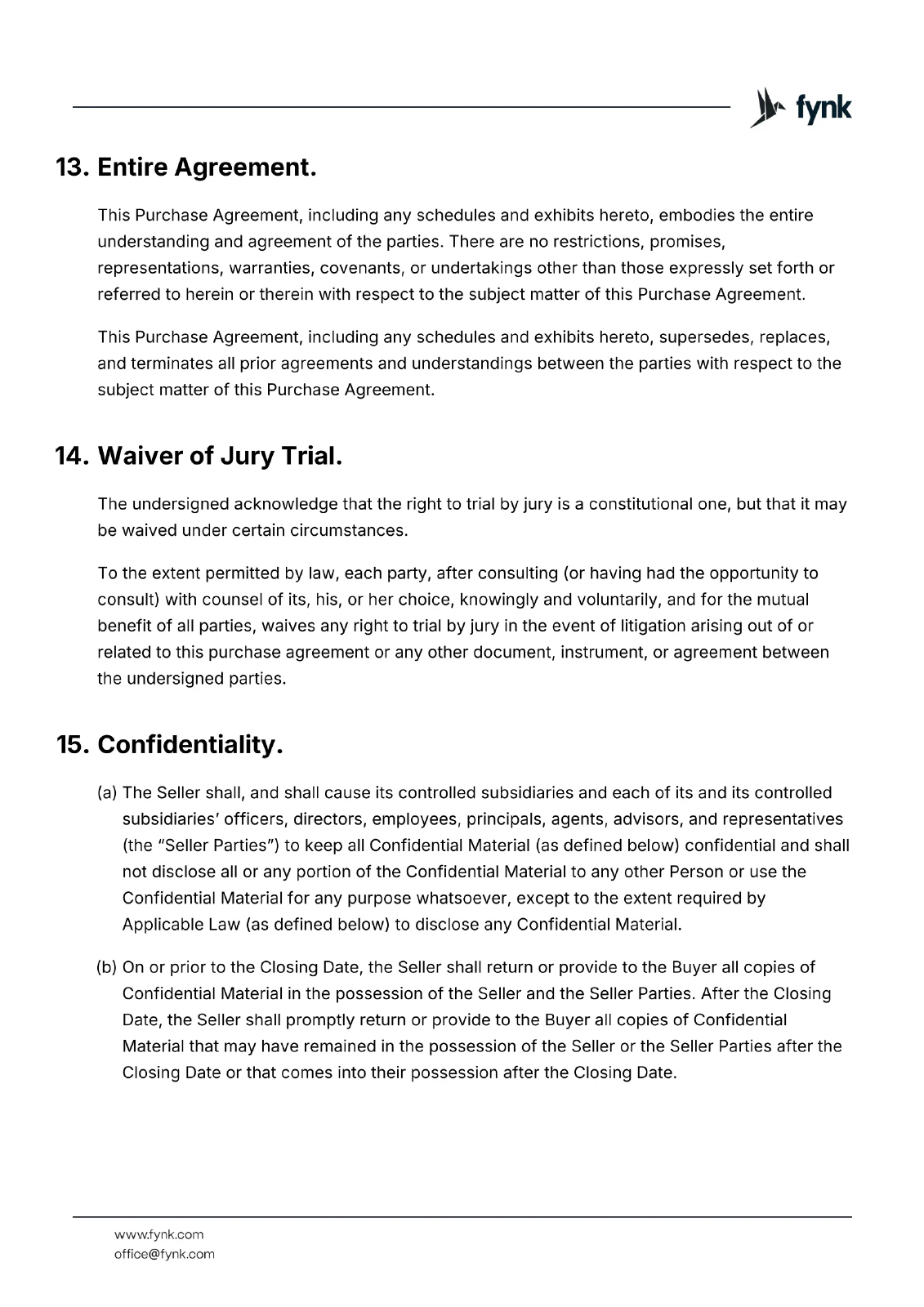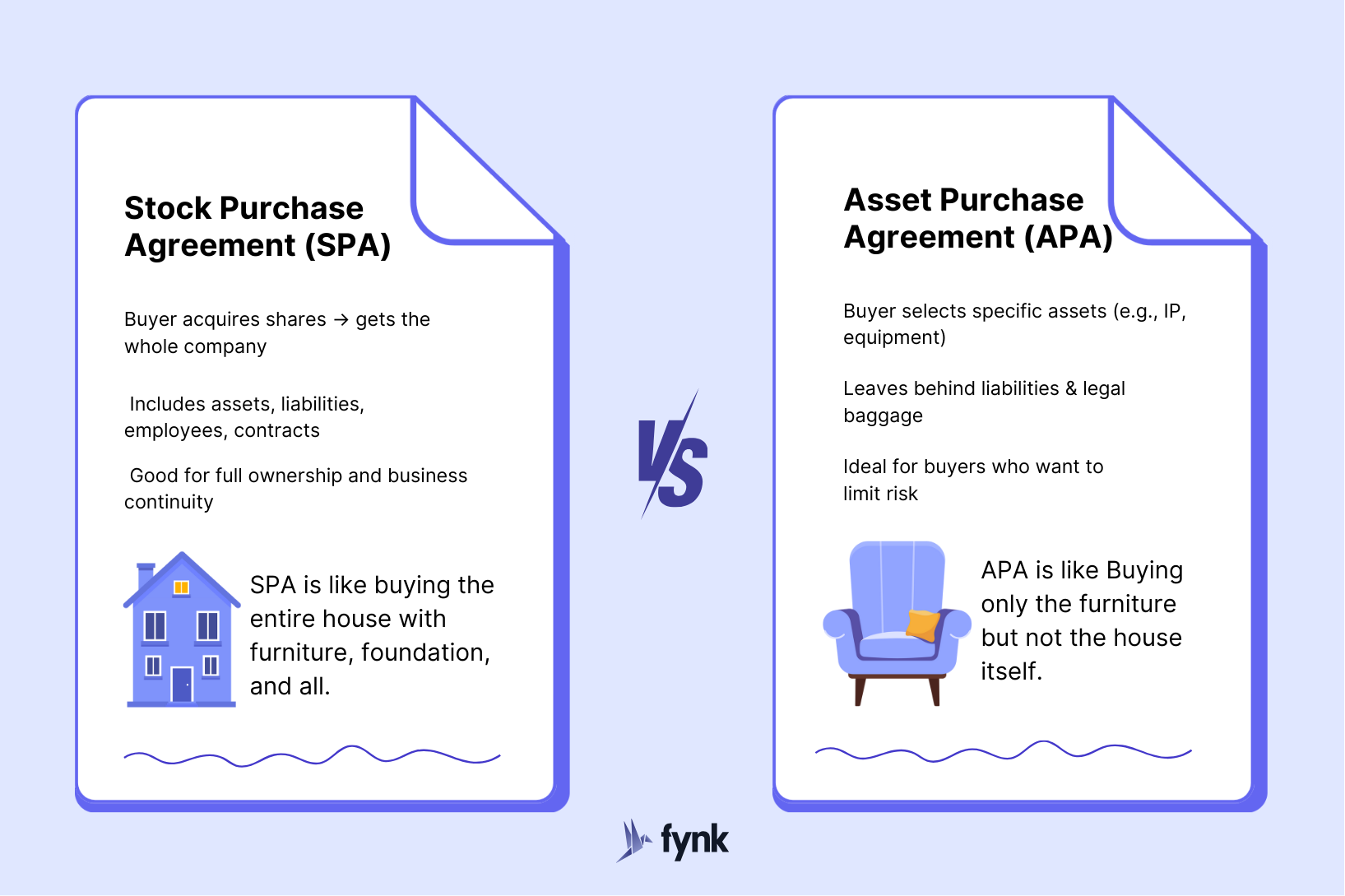Stock Purchase Agreement
This Stock Purchase Agreement, dated as of (this “Purchase Agreement”), is entered into by and between , (the “Buyer”) and , a corporation (the “Seller”).
Recitals
WHEREAS, the Seller desires to sell to Buyer all of the shares of , a corporation (the “Company”), set forth beside the Seller’s name on Schedule I hereto (the “Company Stock”), and Buyer desires to purchase such Company Stock from the Seller on the terms and subject to the conditions provided herein;
NOW, THEREFORE, in consideration of the mutual agreements and covenants contained herein, the Seller and the Buyer hereby agree as follows:
Purchase of Company Stock; Purchase Price.
Sale of Company Stock.
The Seller hereby sells, assigns, transfers, conveys, and delivers to Buyer, free and clear of all mortgages, liens, pledges, security interests, charges, claims, options, warrants, contracts, commitments, demands, restrictions, and encumbrances of any kind or nature whatsoever, except to the extent imposed by applicable securities laws (“Liens”), effective at the closing of the transactions contemplated by this Purchase Agreement (the “Closing”, and the date of such Closing, the “Closing Date”), the Company Stock. Buyer hereby accepts delivery of such Company Stock and hereby purchases such Company Stock from the Seller at the Closing.
Closing Payment.
At the Closing, Buyer shall pay to the Seller an amount in cash equal to (the “Closing Payment”).
Insurance and Benefit Plans.
The parties acknowledge and agree that effective at the Closing:
All insurance coverage maintained by the Seller for the benefit of the Company or any of the Company’s subsidiaries shall be terminated; and
The Seller shall have no liability to employees of the Company under any Benefit Plans, and eligibility for and benefits under all Benefit Plans maintained by the Seller for the benefit of employees of the Company shall be terminated.
For purposes hereof, “Benefit Plans” means any and all deferred compensation, incentive compensation, equity-based compensation plan, employment or consulting, severance or termination pay, holiday, vacation, or other bonus plan or practice, hospitalization or other medical, life or other insurance, supplemental unemployment benefits, profit sharing, pension, or retirement plan, program, agreement, commitment or arrangement, and each other employee benefit plan, program, agreement or arrangement of any kind or nature, or with respect to which such Person has any liability, whether direct or indirect, actual or contingent, whether formal or informal, and whether legally binding or not.
For purposes of this Agreement, “Person” means any individual or entity, including any corporation, company, association, partnership, limited liability company, joint venture, trust, or unincorporated organization.
Notwithstanding the foregoing, the parties acknowledge and agree that the dental, life, accidental death and dismemberment, and vision insurance benefits available under an insurance policy issued by shall terminate on or before .
Closing Deliverables.
The following actions shall be taken at Closing:
The Seller will deliver certificates representing the Company Stock, duly endorsed (and accompanied by duly executed stock powers attached hereto as Exhibit A), for transfer to Buyer.
The Buyer will deliver the Closing Payment by wire transfer of immediately available funds to an account specified in writing by Seller prior to the Closing.
The Seller will deliver resignations from and as officers and/or directors of the Company.
Representations, Warranties, and Covenants of the Seller.
The Seller hereby represents, warrants, and covenants to the Buyer as follows:
Authority.
The Seller is a corporation duly organized, validly existing, and in good standing under the laws of .
It has all necessary power and authority to execute and deliver this Purchase Agreement, to perform its obligations hereunder, and to consummate the transactions contemplated hereby.
The execution and delivery of this Purchase Agreement by the Seller and the consummation by the Seller of the transactions contemplated hereby have been duly and validly authorized by all necessary corporate action, and no other corporate proceedings on the part of the Seller are necessary to authorize this Purchase Agreement or to consummate the transactions contemplated hereby.
This Agreement has been duly executed and delivered by the Seller and, assuming the due authorization, execution, and delivery by the Buyer, constitutes the legal, valid, and binding obligation of the Seller, enforceable against the Seller in accordance with its terms.
The Board of Directors of the Seller has reviewed this Purchase Agreement, and all schedules and exhibits hereto, and has approved the execution, delivery, and performance by the Seller of this Purchase Agreement.
Ownership of Company Stock
The Seller is the sole record and beneficial owner of Company Stock as set forth on Schedule I, has good and valid title to such Company Stock, free and clear of any Liens, proxy obligations, voting restrictions, limitations on disposition, adverse claims of ownership or use, or other encumbrances of any kind, and is transferring such Company Stock to the Buyer, pursuant to this Purchase Agreement, free and clear of any Liens.
All such shares of Company Stock have been duly authorized and are validly issued, fully paid, and non-assessable.
The Seller is not a party to any voting agreement, voting trust, proxy, power of attorney, or other understanding or arrangement with respect to the voting or disposition of such Company Stock.
There are no actions, suits, proceedings, challenges, or claims pending or, to the knowledge of the Seller, threatened with respect to or in any manner affecting the ownership by the Seller of any of the Company Stock or the transfer of any of the Company Stock to the Buyer, or that could otherwise reasonably be expected to restrain, enjoin, or prohibit or make illegal the consummation of any of the transactions contemplated under this Purchase Agreement.
No Conflicts.
The execution and delivery of this Purchase Agreement by the Seller does not and will not, and the performance and compliance with the terms and conditions hereof by the Seller and the consummation of the transactions contemplated hereby by the Seller do not and will not:
Violate or conflict with the certificate of incorporation, bylaws, or other organizational documents of the Seller;
Violate any statute, law, rule, regulation, judgment, order, or decree applicable to the Seller or any of its assets or properties;
Require any consent, advance notice, authorization, or approval under, violate, breach, or conflict with any provision of, cause a default under, result in acceleration of any obligation under, create in any party the right to accelerate, terminate, or modify in any manner, or give rise to any new or additional obligation under, any material agreement or instrument to which the Seller is a party or by which the Seller or any of its properties is bound; or
Require any action, approval, consent, or authorization of or by, any notice to, or any registration or filing with, any governmental or regulatory agency, authority, commission, board, bureau, or instrumentality.
Invoices.
To the extent of the actual knowledge of and , any invoices actually received by the Seller on behalf of the Buyer were posted to the Buyer’s accounting records.
No Reliance.
The Seller acknowledges that:
It is a sophisticated investor with sufficient knowledge and experience in financial matters such that it is capable of independently and properly evaluating the risks and merits of its participation in the transactions contemplated by this Purchase Agreement.
It has adequate information concerning the Buyer, the securities of the Buyer, and the business and financial condition of the Buyer and any Affiliate of the Buyer to make an informed decision regarding the transactions contemplated by this Purchase Agreement.
It has independently and without reliance upon the Buyer, and based upon such information as the Seller has deemed appropriate, made its own analysis and decision to enter into this Purchase Agreement.
The Seller confirms that, except as expressly set forth in this Purchase Agreement, it is not relying on any representation or communication (written or oral) of the Buyer or any of its respective Affiliates as investment advice or as an opinion or recommendation to consummate the transactions contemplated by this Purchase Agreement or as to whether the transactions contemplated hereby are prudent or suitable.
For purposes of this Purchase Agreement, “Affiliate” of another Person means a Person directly or indirectly (through one or more intermediate entities) controlling, controlled by, or under common control with that other Person.
Brokers.
The Seller has not used any broker or finder in connection with the transactions contemplated hereby, and there are no claims by any Person under any agreement with the Seller for commissions, finder’s fees, agent’s commissions, or similar payments.
Representations, Warranties, and Covenants of the Buyer.
The Buyer hereby represents, warrants, and covenants to the Seller as follows:
Authority.
Buyer is a corporation duly organized, validly existing, and in good standing under the laws of the jurisdiction of its incorporation.
It has all necessary power and authority to execute and deliver this Purchase Agreement, to perform its obligations hereunder, and to consummate the transactions contemplated hereby.
The execution and delivery of this Purchase Agreement by the Buyer and the consummation by the Buyer of the transactions contemplated hereby have been duly and validly authorized by all necessary corporate action, and no other corporate proceedings on the part of the Buyer are necessary to authorize this Purchase Agreement or to consummate the transactions contemplated hereby.
This Purchase Agreement has been duly executed and delivered by the Buyer and, assuming the due authorization, execution, and delivery by Seller, constitutes the legal, valid, and binding obligation of the Buyer, enforceable against the Buyer in accordance with its terms.
Brokers.
The Buyer has not used any broker or finder in connection with the transactions contemplated hereby, and there are no claims by any Person under any agreement with the Buyer for brokerage commissions, finder’s fees, agent’s commissions, or similar payments.
Release.
In consideration of the delivery of the Closing Payment to the Seller and the other consideration set forth herein, effective as of the Closing, the Seller, on behalf of itself and, to the extent permitted by law, its subsidiaries, officers, directors, employees, successors, successors-in-interest, and assignees (collectively, the “Seller Releasing Persons”), hereby waives and releases, to the fullest extent permitted by law, any and all claims, rights, and causes of action, whether known or unknown (collectively, “Claims”) arising from, relating to, or in connection with the Seller’s ownership of shares of the Company Stock against the Buyer or any of the Buyer’s current or former officers, directors, employees, agents, principals, investors, signatories, advisors, consultants, attorneys, and auditors (collectively, the “Buyer Released Persons”).
Each of the Seller Releasing Persons:
Represents and warrants that it has not filed (whether recently or otherwise) any action, Claim, or lawsuit against any of the Buyer Released Persons;
Represents and warrants that it has not assigned or transferred to any Person any Claims that it has released pursuant to this Section 4; and
Covenants and agrees that it will never file a lawsuit or institute any other action, Claim, or lawsuit asserting any Claim or Claims that it has released pursuant to this Section 4.
Services Agreement; Transition Services.
Commencing on the Closing Date:
Notwithstanding anything to the contrary contained in the , dated (the “Services Agreement”), pursuant to which the Seller provides back-office services to Buyer, the Services Agreement is hereby terminated effective immediately and is no longer in force and effect.
For a period of 0 days, the Seller will provide, or cause to be provided, to the Buyer, solely to enable the Buyer immediately following the Closing to conduct its business as conducted by the Buyer immediately prior to the Closing, the services described on Exhibit B attached hereto.
Expenses and Taxes.
Each party will be responsible for all of such party’s own costs and expenses incurred in connection with this Purchase Agreement and the transactions contemplated hereby. The Seller shall pay all sales, use, stamp, transfer, service, recording, and like taxes or fees, if any, imposed by any governmental authority in connection with the transfer and assignment of the Company Stock.
Further Assurances.
Subject to the terms and conditions contained in this Purchase Agreement, each party shall use such party’s best efforts to take, or cause to be taken, all actions, and to do, or cause to be done, all things necessary, proper, or advisable to consummate and make effective the transactions contemplated by this Purchase Agreement.
Amendment.
This Purchase Agreement may be amended only by a written agreement signed by the parties.
Waiver of Compliance.
Except as otherwise provided in this Purchase Agreement, any failure of a party to comply with any representation, warranty, covenant, or condition contained herein may be waived by the party entitled to the benefits thereof only by a written instrument signed by the party granting such waiver. However, such waiver or failure to insist upon strict compliance with such representation, warranty, covenant, or condition does not operate as a waiver of, or estoppel with respect to, any subsequent or other failure.
Governing Law.
This Agreement shall be governed by, interpreted under, and construed in accordance with the internal laws of the , without giving effect to principles of conflicts of laws.
Any action, suit or proceeding to enforce any provision of, or based on any matter arising out of or in connection with, this Purchase Agreement or the transactions contemplated hereby shall be brought in , and the parties agree to the exclusive jurisdiction of such courts (and of the appropriate appellate courts therefrom). Each party waives (to the fullest extent permitted by law) any objection it may have to the laying of venue of any such suit, action, or proceeding in any such court or that any such suit, action, or proceeding has been brought in an inconvenient forum.
Counterparts.
This Purchase Agreement may be executed in counterparts, each of which shall be deemed an original, but all of which together shall constitute one and the same instrument.
Captions.
The captions contained in this Purchase Agreement are solely for purposes of reference, are not part of the agreement of the parties, and do not in any way affect the meaning or interpretation of this Purchase Agreement.
Entire Agreement.
This Purchase Agreement, including any schedules and exhibits hereto, embodies the entire understanding and agreement of the parties. There are no restrictions, promises, representations, warranties, covenants, or undertakings other than those expressly set forth or referred to herein or therein with respect to the subject matter of this Purchase Agreement.
This Purchase Agreement, including any schedules and exhibits hereto, supersedes, replaces, and terminates all prior agreements and understandings between the parties with respect to the subject matter of this Purchase Agreement.
Waiver of Jury Trial.
The undersigned acknowledge that the right to trial by jury is a constitutional one, but that it may be waived under certain circumstances.
To the extent permitted by law, each party, after consulting (or having had the opportunity to consult) with counsel of its, his, or her choice, knowingly and voluntarily, and for the mutual benefit of all parties, waives any right to trial by jury in the event of litigation arising out of or related to this purchase agreement or any other document, instrument, or agreement between the undersigned parties.
Confidentiality.
The Seller shall, and shall cause its controlled subsidiaries and each of its and its controlled subsidiaries’ officers, directors, employees, principals, agents, advisors, and representatives (the “Seller Parties”) to keep all Confidential Material (as defined below) confidential and shall not disclose all or any portion of the Confidential Material to any other Person or use the Confidential Material for any purpose whatsoever, except to the extent required by Applicable Law (as defined below) to disclose any Confidential Material.
On or prior to the Closing Date, the Seller shall return or provide to the Buyer all copies of Confidential Material in the possession of the Seller and the Seller Parties. After the Closing Date, the Seller shall promptly return or provide to the Buyer all copies of Confidential Material that may have remained in the possession of the Seller or the Seller Parties after the Closing Date or that comes into their possession after the Closing Date.
Except as otherwise provided herein, this Purchase Agreement is being executed by the parties with the understanding that the subject matter and terms hereof shall remain strictly confidential, and none of the existence of this Purchase Agreement, the contents hereof, or any plans or proposals related hereto will be, directly or indirectly, discussed with or disclosed by the parties to any third party (other than their respective advisors or representatives on a “need-to-know” basis who agree to comply with the provisions hereof, or in the case of outside counsel are bound by the attorney-client privilege), except:
As outside counsel advises is required by the disclosing party to comply with Applicable Law;
As required for the Seller to comply with its SEC reporting obligations; or
With the prior written consent of the other party.
“Confidential Material” means any and all confidential and proprietary information not generally available to the public concerning the Company (including its Affiliates), its business and operations, or its current and former directors, officers, employees, agents, and advisors.
“Applicable Law” means any applicable law, regulation, rule, or legal or judicial process (including, without limitation, by oral questions, interrogatories, requests for information or documents, subpoena, civil investigative demand, or other legal process) of any foreign, federal, state, or local government or subdivision thereof, or governmental, judicial, legislative, executive, administrative, or regulatory authority, self-regulatory organization, agency, commission, tribunal, or body, including the in the case of the Seller.
IN WITNESS WHEREOF, the parties have duly executed this Purchase Agreement as of the date first written above.
Schedule I
This Schedule I lists the shares of (the “Company”) owned by and sold to under the terms of the Stock Purchase Agreement, dated as of [Date] (the “Purchase Agreement”).
Seller | Company Stock | Price per Share |
|---|---|---|
[Number of Shares] |
Exhibit A
Form of assignment separate from certificate
For value received, hereby sells, assigns, and transfers to , a corporation, shares of Common Stock, par value per share, of , a corporation (the “Company”), standing in [Seller’s Pronoun: his/her/their] name on the books of the Company represented by book entry shares, and does hereby irrevocably constitute and appoint , to transfer said stock on the books of the Company with full power of substitution in the premises.
This Assignment Separate from Certificate is delivered and may only be used in accordance with the Stock Purchase Agreement dated as of .
Exhibit B
DESCRIPTION OF TRANSITION SERVICES
Commencing on the Closing Date, the Seller will provide, or cause to be provided, to the Buyer the following services for a period of thirty (30) days. These services are intended solely to enable the Buyer to conduct its business as it was conducted immediately prior to the Closing:
[Service 1: Description of the specific service to be provided, e.g., "Accounting and financial reporting support, including preparation and delivery of financial statements."]
[Service 2: Description of another service, e.g., "Maintenance and administration of payroll processing systems."]
[Service 3: Description of another service, e.g., "Assistance with information technology systems, including data migration and support for existing platforms."]
[Service 4: Description of another service, e.g., "Facilitation of human resources functions, including benefits administration."]
Service Scope and Limitations
The services provided by the Seller under this Exhibit B are limited to those specifically listed above and are intended solely to facilitate the transition of operations to the Buyer.
The Seller is not obligated to provide additional services beyond those expressly described in this Exhibit B unless otherwise agreed to in writing by both parties.
Dated:

